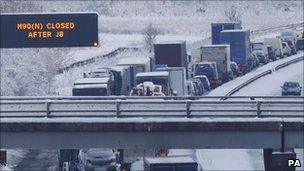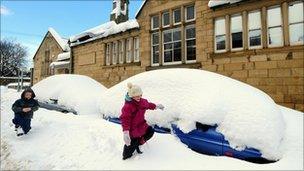Hundreds of schools shut as more snow forecast
- Published
Schools have been forced to close following icy conditions in West Yorkshire, Northumberland, central Scotland and Cornwall.
More than a thousand schools were closed across the UK on Monday, with snow causing the most travel chaos in Scotland and the north of England.
Motorists and air passengers faced icy conditions and long delays, with disruptions expected to continue amid fresh snow forecasts.
Durham Tees Valley airport remains closed but Edinburgh airport has partially reopened to flight arrivals.
About 1,200 homes in Scotland still have no electricity.
Scottish and Southern Energy said 3,000 homes - mostly in the Perth and Tayside areas - had been affected earlier but engineers had been reconnecting electricity supplies throughout the day.
Lightning and thunderstorms have also caused power cuts in Cornwall.
Meanwhile, a rescue operation has been launched in Lincolnshire to free up to 60 cars stuck on a road which has become impassable.
Police and farmers were working to move the vehicles, which became trapped on a hill on the A153 near Louth since at around 1800GMT.
The Local Government Association said councils had increased stockpiles of salt and grit but Aberdeenshire was rationing supplies of salt.
The council said it had used 12,000 tonnes of salt so far this year, compared with 3,500 tonnes during the same period in 2009, but it expected fresh supplies to arrive later this week.
In Scotland, which was worst affected by heavy snow, more than 800 schools closed, from Shetland to Edinburgh and the Lothians.
Edinburgh City council, Perth and Kinross council, Moray council and Midlothian council, declared the situation "a severe weather emergency" and said schools would remain closed on Tuesday.
More than 450 schools closed in England, with Tyne and Wear, Northumberland, County Durham, Cumbria, East Yorkshire and Shropshire particularly affected.
About 93 schools across Northern Ireland also closed because of the bad weather, while 10 schools closed in Wales.
Hundreds of motorists were trapped in their cars in Scotland overnight and traffic was backed up for several miles on the A9 between Dunblane and Perth after several lorries jack-knifed.
The road later reopened in both directions, although police have advised drivers not to travel unless absolutely necessary.

Both major and minor routes have been badly affected by the snow
Motorists travelling on the M62 between junction 34 and junction 38 in West Yorkshire have been urged to take care, while one of the main routes into Sheffield, the Parkway, was said to be "treacherous".
In the South West, one lane of the eastbound M4 at the Severn Crossing was closed as a precaution, but has since reopened, after ice started to form on the bridge.
Gritting lorries servicing icy roads were attacked by youths in Londonderry on Sunday and a number of roads in the Creggan and Gobnascale areas of the city went untreated as a result.
Meanwhile in North Tyneside, a council spokesman said rubbish collections had been suspended so that refuse collection vehicle drivers and crews could help grit roads.
Biting winds
BBC broadcast meteorologist Philip Avery warned plummeting temperatures overnight on Monday were likely to lead to icy roads in many places, while the strengthening winds would make it feel even colder.
The UK has been experiencing the earliest widespread snowfall since 1993.

Many children have been unable to go to school after heavy snow led some to shut
Met Office severe weather warnings , externalfor icy roads - and snow in places - are in place for central and eastern Scotland and eastern parts of Northern Ireland.
Warnings of heavy snow are also in place along the entire east coast of England, as well as in Cornwall, with more expected throughout Monday and Tuesday.
Mr Avery said the worst weather would be in central and eastern Scotland and north-eastern England but added: "There is a likelihood of wind in the northern half of the British Isles picking up in strength, leading to more significant drifting."
The Greater London area and Kent are at risk of snowfall, with the Met Office warning drifting snow could cause disruption to road and rail networks towards the end of the week.
David Sparks, from the Local Government Association, said councils were prepared this year to cope with the winter weather.
He told the BBC: "Local authorities this year have made unprecedented preparations for the winter.
"We've got well over a third more salt and grit in our stocks than we had last year and over a half of local authorities have invested in new gritting lorries."
He said individuals also had to make their own preparations and added: "What everyone needs to realise is that you cannot control or battle with the weather if it is unprecedented. You need to try to mitigate the effects."
Motoring organisations the AA and the RAC warned commuters to continue to take great care, even on major roads that have been gritted.
One Rothbury resident describes it as the worst weather to hit the region in over 20 years
The AA said it was on course to have one of its busiest days in its 105-year history.
It said that by 1730 GMT on Monday it had received just under 20,000 calls for assistance - compared with about 10,500 during the whole of a normal Monday in November.
Spokesman Paul Leather said: "We're busy all over the country, not just in those areas with snow. In these very cold temperatures, a car battery might only work at 50% of its capacity, which means it really struggles to cope with the bigger load it's under.
"Give the battery a chance by switching off all the electrics - lights, blowers, automatic wipers, heated seats and rear windscreen, radio etc - before you start the car.
"It also helps to dip the clutch as you turn the ignition as it takes more load off the starter motor and, ultimately, the battery," he added.
Stephen Alambritis, from the Federation of Small Businesses, said commuters needed to do their best to get to work despite the weather.
He said: "If we look at absence from work as costing the UK each year £13bn then, obviously, one day's absence will be into the millions, in terms of cost but also in terms of foregone business.
"If staff are not in place at work, calls are missed, contracts are not signed, invoices are not sent out and cheques are not banked."
The coldest place in the UK on Sunday night was Altnaharra in northern Scotland, which recorded a low of -16.1C (3F).
The temperature in Llysdinam, which saw Wales's coldest ever November reading on Saturday of -18C (-0.4F), was -12.9C (8.8F) on Sunday night.
The temperature at RAF Northolt in west London was -2.2C (28F) but on Dartmoor it was -7.9C (17.8F).
The unusual weather is being caused by high pressure over Greenland and low pressure in the Baltic states, forcing cold winds from the north-east across Europe.
- Published29 November 2010
- Published29 November 2010
- Published29 November 2010
- Published29 November 2010
- Published28 November 2010